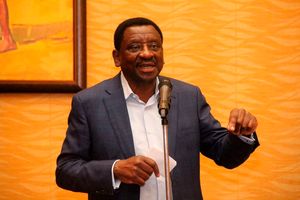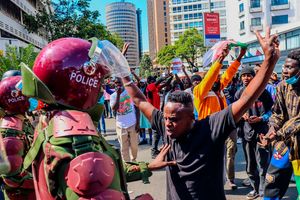
The International Monetary Fund Headquarters in Washington, DC.
As the outrage against the Finance Bill 2024 reached its crescendo with President William Ruto declining to assent to the draft law, attention quickly shifted to the role of the International Monetary Fund (IMF).
Following Tuesday’s protests that left scores dead, thousands injured, and properties worth millions of shillings destroyed, Dr Ruto sent back to the National Assembly the revenue-raising Bill riddled with the IMF’s fingerprints asking it to delete all its clauses.
"Now therefore, in exercise of the powers conferred to me by Article 115(1)(b) of the Constitution and having reservations on the contents of the Bill in its entirety, I decline to assent to the Finance Bill, 2024 and refer the Bill for recommendation for the deletion of all the clauses thereof," said President Ruto in his memorandum of referral.
The IMF, and its sibling the World Bank, have shaped the country’s fiscal journey since independence— for better or for worse.
From the structural adjustment programmes of the 1990s to the recent amendments contained in the Finance Bill 2024, the pair that rose out of the Bretton Woods consensus in the aftermath of the Second World War have loomed large in the country’s economic history.
But while the World Bank tends to lend, also with conditions, for economic prosperity, the IMF lends for financial stability. And the IMF’s prescriptions can be painful.
From international news coverage to media statements from personalities such as South Africa’s firebrand opposition politician Julius Malema and US representative Ilhan Omar, the IMF has been the perfect bogeyman in the current protests. Kenya joins several other countries that have at some point protested against the painful IMF-backed tax measures, including Argentina, Spain, Greece, Indonesia, Ecuador, Egypt, and Suriname.
In the case of Kenya, a chunk of the contentious measures contained in the Finance Bill 2024 for the fiscal year starting July are part of a lending programme that Kenya has with the multilateral financier.
Kenya entered into the programme in 2021 under the administration of retired President Uhuru Kenyatta. The deal introduced various belt-tightening measures, including the far-reaching tax measures that triggered the nationwide protests.
These include introduction of various new taxes such as the motor vehicle tax and eco levy, increasing excise duty on airtime and M-Pesa transaction fees, and introducing the 16 per cent value-added tax (VAT) on a lot of zero-rated items, including ordinary bread.
While the measures are aimed at averting a financial crisis similar to that which occurred in Ghana and Zambia–two African countries that have already defaulted on their debt obligations–they have instead sent shockwaves in the economy with a lot of consumers blaming them for the increased cost of living.
Kenya has had 23 lending programmes with the IMF since it joined the Bretton Woods institution in 1964. One thing with the IMF is its consistency.
In the last 10 years, for example, the Kenyan Government has attempted to introduce VAT on bread three times.
While the several attempts to introduce VAT on the staple reveal the flip-flopping nature of Kenyan politicians, it has demonstrated the consistency of the IMF’s prescription.
The IMF, which marked its 80th anniversary, was created after the Second World War to provide financial stability in the global economy; to nip in the bud signs of financial distress in any corner of the world before they can mutate and destabilise the entire financial ecosystem.
It achieves this by entering into a conditional lending programme with its members.
Often these terms involve austerity measures that involve increasing taxes and cutting spending, or what is technically known as fiscal consolidation.
The IMF, a global lender of last resort, has supported most of these measures as a condition for providing financial assistance to Kenya. When the Jubilee administration came to power in March 2013, they found a two-year Extended Credit Facility (ECF) that was to lapse in December of the same year. The Uhuru Kenyatta administration hastily passed into law an IMF-backed Value Added Tax Bill 2013. The VAT Act, 2013 removed items such as electricity, cooking gas, textbooks, computer hardware and software, animal feeds, and chemical fertilisers from the zero-rated schedule. This means the items would henceforth attract VAT, thus making them expensive.
Initially, ordinary bread and maize meal had also been candidates for removal from the Second Schedule of the Act but after pressure from the civil society, the Kenyatta government agreed to exclude these essentials.
VAT on petroleum products—petrol, diesel, and kerosene— was delayed for three years.
When the $649,731,600 IMF lending programme that the Jubilee government had inherited from the late Mwai Kibaki government ended, a fresh one was signed on February 02, 2015. These were two precautionary facilities. Besides re-introducing VAT on bread and maize meals, and other zero-rated items, the IMF also pushed for the implementation of VAT on fuel beginning in 2016 under the standby arrangments. But in 2018 Kenya lost access to the insurance facility amounting to $989 million due to excessive borrowing.
Kenyatta’s government had not met some of the terms contained in the lending deal including introducing the 16 per cent VAT.
Instead of raising taxes, Kenya went on a borrowing spree, gobbling up Chinese and Eurobond loans to fund roads, railways, and energy projects.
Besides the high debt levels, Kenya’s failure to remove interest rate controls which had affected lending in the economy was also a deal-breaker.
After the ugly divorce with the IMF, Treasury mandarins, led by the then Cabinet Secretary Henry Rotich, even suggested that Kenya did not need to be patronised by the IMF, having put its house in order.
They boasted of how they had not tapped into the $989 million standby arrangement (SBA) despite the country being hit by drought. Kenya stayed away from the IMF until 2021 when it was reeling under the heavy blows of the Covid-19 pandemic.
At the height of the pandemic in 2020, the country’s foreign exchange reserves (forex) fell as exports underperformed as key markets such as Europe and the US locked down their economies. Tourism receipts slumped due to travel curbs, and tax earnings were reduced after the Treasury slashed some tax heads such as income tax and value-added tax (VAT). The economy slowed down due to the containment measures that restricted movements.
That year the IMF provided Kenya with emergency funds before the two parties entered a $2.34 billion programme in 2021. The lending was aimed at supporting recovery and debt management. The programme, which was initially to run for 38 months, was signed by the former Treasury Cabinet Secretary Ukur Yatani.
But now, it was time to dance to IMF’s tune. Kenyatta, who had then teamed up with his arch-rival former Prime Minister Raila Odinga, decided this was the time to push through the 16 per cent VAT on fuels. Kenyatta’s deputy, Dr Ruto, was on the other side.
Kenyans, joined by Dr Ruto, protested but the Finance Act 2021 was passed and sent to Kenyatta for assent. Mr Kenyatta was forced to return the Bill to Parliament recommending that VAT on petroleum products be slashed to eight per cent.
Interest rate caps were removed. In the Finance Bill, 2021, Mr Yatani would also attempt to introduce 16 per cent VAT on bread. And just like in the Finance Bill 2024, this proposal was also rejected.
When Ruto’s government came to power, they agreed with the IMF to increase VAT on petroleum products to 16 per cent. Excise duty on airtime and fees on mobile money transfer fees were also to be increased from 15 to 20 per cent and the motor vehicle tax was to be introduced in the Finance Act 2023, but these were delayed until this year. The government was also to reduce a lot of tax expenditures–foregone taxes–by introducing VAT on a lot of zero-rated items like bread.
According to the IMF, these measures would have given the government upwards of Sh32 billion. But these were delayed to this year. And now they will be delayed even further after the entire Finance Bill was rejected.










